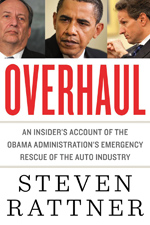Originally published in the Financial Times
America goes to the polls on Tuesday with every indication that a dramatic transfer of power is afoot. Republicans are all but certain to take control of the House of Representatives, and are poised to make significant gains in the Senate. Even if Democrats retain the upper chamber, dramatic changes will begin on Capitol Hill.
The most important will be a switch in control of influential Congressional committees, giving rise to fears that the administration will soon be subjected to a stream of distracting, innuendo-filled investigations. America may be entertained both by the dizzying array of such political fireworks, and the perpetual tan Republican John Boehner will bring to the Speaker’s chair. But a rightward shift in policy is a virtual certainty.
That said, neither party will be able to muster the votes needed to force through legislation. This was also true in the early days of Mr Obama’s administration, when a Democratic majority in the House routinely passed his proposals but he needed to convince a small number of Republicans to pass bills in the Senate. Now the tables will be reversed: Republicans will pass bills unloved by his administration, but Democrats will block them in the Senate.
Even though the president retains his ability to veto any legislation, the outcome of this mud wrestling match is hard to predict. A stalemate in which little happens is entirely possible, particularly as the nation’s eyes turn to the absurdly long run up to the 2012 Presidential race. Alternatively, Mr Obama could risk the enmity of the left, and tack to the right.
America got a mix of both after Bill Clinton, the former President – in an extraordinary electoral rout – lost control of both Houses of Congress in 1994. Then Republicans moved quickly to implement their Contract with America. But while its proposals were nearly all approved by the House, in the Senate nearly all died.
Meanwhile, Mr Clinton pivoted, declaring the era of big government over and forging compromises with his adversaries, notably on welfare reform. But the two years were ugly, and included a shutdown of the government.
This time around the Republicans have laid out their “Pledge to America”, a bloated 46-page descendant of the original contract, which was less than three pages long. The new version is little more than a reheated mishmash of Republican nostrums about smaller government. It also ducks the single toughest issue facing America: how to fix an unacceptably high budget deficit.
It may add up to electoral victory, but it falls far short of sensible policy, and it is hard to be optimistic. That said, this unappetizing stew will not necessarily diminish Mr Obama’s chances of being re-elected in 2012. Indeed, it may even enhance them if he takes his chance to run against Congress – as Harry Truman, the former president, did by campaigning against the “Do Nothing” Congress in 1948 and squeaking out a come-from-behind victory.
The first two years of Mr Obama’s administration were exceptionally productive legislatively, with the stimulus, healthcare, and financial regulatory reform all enacted. But the list of unfinished business is long: action on climate change, reform of entitlement spending, and a revamp of the two zombie housing agencies, Fannie Mae and Freddie Mac.
Perhaps only the business community will find something to like in this fortified position, inferring that little unfriendly legislation will emerge. Recent rises in the US stock market may well reflect this anticipation. But in the long run, such gridlock cannot be good for America.


